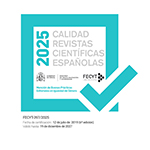Palabras, mejor de una en una: los niños con dislexia ante la lectura de palabras presentadas simultáneamente
Resumen
Diferentes estudios han reportado que los lectores competentes se benefician de la presentación simultánea de palabras durante la lectura. Por otra parte, la existencia de representaciones ortográficas de las palabras parece facilitar el inicio de la codificación fonológica de la palabra contigua, que se iniciaría durante el proceso de articulación de la palabra target. Sin embargo, este beneficio podría no darse en los niños con dislexia, considerando su escasa competencia lectora. El objetivo de este estudio era investigar si los niños con dislexia se benefician de la presentación simultánea de palabras escritas y si esto depende de las características de los estímulos. Para ello, niños con y sin dislexia participaron en dos tareas de lectura. En la primera tarea, las palabras, manipuladas en frecuencia y longitud, se presentaban de manera aislada; mientras que la segunda tarea se trataba de listas de tres palabras, en las que se manipulaba la frecuencia y longitud de la tercera palabra. Los resultados pusieron de relieve las dificultades lectoras en el grupo con dislexia, con peor rendimiento que el grupo control en ambas tareas. Por otra parte, ambos grupos obtuvieron ventaja de la presentación simultánea de palabras, con tiempos previos a la articulación de la palabra menores en la presentación simultánea que en la palabra aislada. Sin embargo, este beneficio no se dio en los tiempos de articulación y exactitud lectora en los niños con dislexia, especialmente cuando se trataba de palabras largas e infrecuentes, sugiriendo que los niños dislexia no alcanzan el mismo nivel de preprocesamiento que los niños del grupo control.
Descargas
Licencia
La Revista de Investigación en Logopedia, para fomentar el intercambio global del conocimiento, facilita el acceso sin restricciones a sus contenidos desde el momento de su publicación en la presente edición electrónica, y por eso es una revista de acceso abierto. Los originales publicados en esta revista son propiedad de la Universidad Complutense de Madrid y es obligatorio citar su procedencia en cualquier reproducción total o parcial. Todos los contenidos se distribuyen bajo una licencia de uso y distribución Creative Commons Reconocimiento 4.0 (CC BY 4.0). Esta circunstancia ha de hacerse constar expresamente de esta forma cuando sea necesario. Puede consultar la versión informativa y el texto legal de la licencia.












